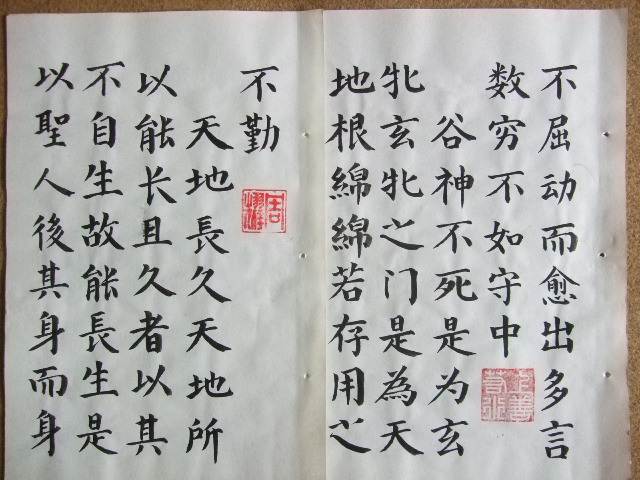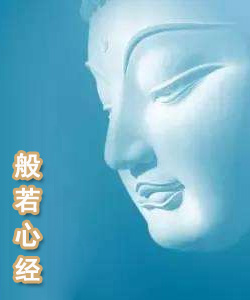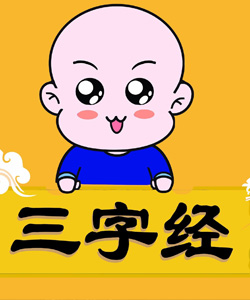老子道德经英文全文版(4)
道德经·第三十一章:贵左(Tao Te Ching. The thirty-first chapter: Gui Zuo)
Now arms, however beautiful, are instruments of evil omen, hateful, it may be said, to all creatures. Therefore they who have the Tao do not like to employ them.
The superior man ordinarily considers the left hand the most honourable place, but in time of war the right hand. Those sharp weapons are instruments of evil omen, and not the instruments of the superior man;--he uses them only on the compulsion of necessity. Calm and repose are what he prizes; victory (by force of arms) is to him undesirable. To consider this desirable would be to delight in the slaughter of men; and he who delights in the slaughter of men cannot get his will in the kingdom.
On occasions of festivity to be on the left hand is the prized position; on occasions of mourning, the right hand. The second in command of the army has his place on the left; the general commanding in chief has his on the right;--his place, that is, is assigned to him as in the rites of mourning. He who has killed multitudes of men should
weep for them with the bitterest grief; and the victor in battle has his place (rightly) according to those rites.
道德经·第三十二章:知止(Tao Te Ching. The thirty-second chapter: knowledge)
The Tao, considered as unchanging, has no name.
Though in its primordial simplicity it may be small, the whole world dares not deal with (one embodying) it as a minister. If a feudal prince or the king could guard and hold it, all would spontaneously submit themselves to him.
Heaven and Earth (under its guidance) unite together and send down the sweet dew, which, without the directions of men, reaches equally everywhere as of its own accord.
As soon as it proceeds to action, it has a name. When it once has that name, (men) can know to rest in it. When they know to rest in it, they can be free from all risk of failure and error.
The relation of the Tao to all the world is like that of the great rivers and seas to the streams from the valleys.
道德经·第三十三章:尽己(Tao Te Ching. The thirty-third chapter: do all you can)
He who knows other men is discerning; he who knows himself is intelligent. He who overcomes others is strong; he who overcomes himself is mighty. He who is satisfied with his lot is rich; he who
goes on acting with energy has a (firm) will.
He who does not fail in the requirements of his position, continues long; he who dies and yet does not perish, has longevity.
道德经·第三十四章:成大(Tao Te Ching. The thirty-fourth chapter: Cheng Da)
All-pervading is the Great Tao! It may be found on the left hand and on the right.
All things depend on it for their production, which it gives to them, not one refusing obedience to it. When its work is accomplished, it does not claim the name of having done it. It clothes all things as with a garment, and makes no assumption of being their lord;--it may be named in the smallest things. All things return (to their root and disappear), and do not know that it is it which presides over their doing so;--it may be named in the greatest things.
Hence the sage is able (in the same way) to accomplish his great achievements. It is through his not making himself great that he can accomplish them.

道德经·第三十五章:大象(Tao Te Ching. Thirty-fifth chapter: elephant)
To him who holds in his hands the Great Image (of the invisible Tao), the whole world repairs. Men resort to him, and receive no hurt, but (find) rest, peace, and the feeling of ease.
Music and dainties will make the passing guest stop (for a time). But though the Tao as it comes from the mouth, seems insipid and has no flavour, though it seems not worth being looked at or listened to, the use of it is inexhaustible.
道德经·第三十六章:微明(Tao Te Ching. The thirty-sixth chapter: Wei Ming)
When one is about to take an inspiration, he is sure to make a (previous) expiration; when he is going to weaken another, he will first strengthen him; when he is going to overthrow another, he will first have raised him up; when he is going to despoil another, he will first have made gifts to him:--this is called 'Hiding the light (of his procedure).'
The soft overcomes the hard; and the weak the strong.
Fishes should not be taken from the deep; instruments for the profit of a state should not be shown to the people.
道德经·第三十七章:无为(Tao Te Ching. The thirty-seventh chapter: inaction)
The Tao in its regular course does nothing (for the sake of doing it), and so there is nothing which it does not do.
If princes and kings were able to maintain it, all things would of themselves be transformed by them.
If this transformation became to me an object of desire, I would
express the desire by the nameless simplicity.
Simplicity without a name is free from all external aim. With no desire, at rest and still, all things go right as of their will.
道德经·第三十八章:处厚(Tao Te Ching. The thirty-eighth chapter: location and thickness)
(Those who) possessed in highest degree the attributes (of the Tao) did not (seek) to show them, and therefore they possessed them (in fullest measure). (Those who) possessed in a lower degree those attributes (sought how) not to lose them, and therefore they did not possess them (in fullest measure).
(Those who) possessed in the highest degree those attributes did nothing (with a purpose), and had no need to do anything. (Those who) possessed them in a lower degree were (always) doing, and had need to be so doing.
(Those who) possessed the highest benevolence were (always seeking) to carry it out, and had no need to be doing so. (Those who) possessed the highest righteousness were (always seeking) to carry it out, and had need to be so doing.
(Those who) possessed the highest (sense of) propriety were (always seeking) to show it, and when men did not respond to it, they bared the arm and marched up to them.
Thus it was that when the Tao was lost, its attributes appeared; when its attributes were lost, benevolence appeared; when benevolence
was lost, righteousness appeared; and when righteousness was lost, the proprieties appeared.
Now propriety is the attenuated form of leal-heartedness and good faith, and is also the commencement of disorder; swift apprehension is (only) a flower of the Tao, and is the beginning of stupidity.
Thus it is that the Great man abides by what is solid, and eschews what is flimsy; dwells with the fruit and not with the flower. It is thus that he puts away the one and makes choice of the other.
道德经·第三十九章:得一(Tao Te Ching. The thirty-ninth chapter: getting one)
The things which from of old have got the One (the Tao) are--
Heaven which by it is bright and pure;
Earth rendered thereby firm and sure;
Spirits with powers by it supplied;
Valleys kept full throughout their void
All creatures which through it do live
Princes and kings who from it get
The model which to all they give.
All these are the results of the One (Tao).
If heaven were not thus pure, it soon would rend; If earth were not thus sure, 'twould break and bend; Without these powers, the spirits soon would fail; If not so filled, the drought would parch each vale; Without that life, creatures would pass away; Princes and kings, without that moral sway, However grand and high, would all decay.
Thus it is that dignity finds its (firm) root in its (previous) meanness, and what is lofty finds its stability in the lowness (from which it rises). Hence princes and kings call themselves 'Orphans,' 'Men of small virtue,' and as 'Carriages without a nave.' Is not this an acknowledgment that in their considering themselves mean they see the foundation of their dignity? So it is that in the enumeration of the different parts of a carriage we do not come on what makes it answer the ends of a carriage. They do not wish to show themselves elegant-looking as jade, but (prefer) to be coarse-looking as an (ordinary) stone.
道德经·第四十章:反复(Tao Te Ching. The fortieth chapter: repetition)
The movement of the Tao
By contraries proceeds;
And weakness marks the course
Of Tao's mighty deeds.
All things under heaven sprang from It as existing (and named); that existence sprang from It as non-existent (and not named).
相关文章:
相关推荐:




